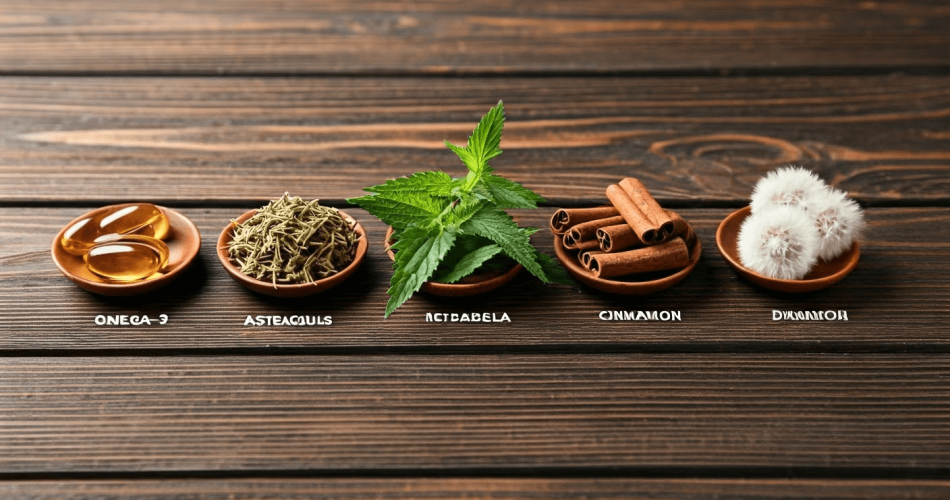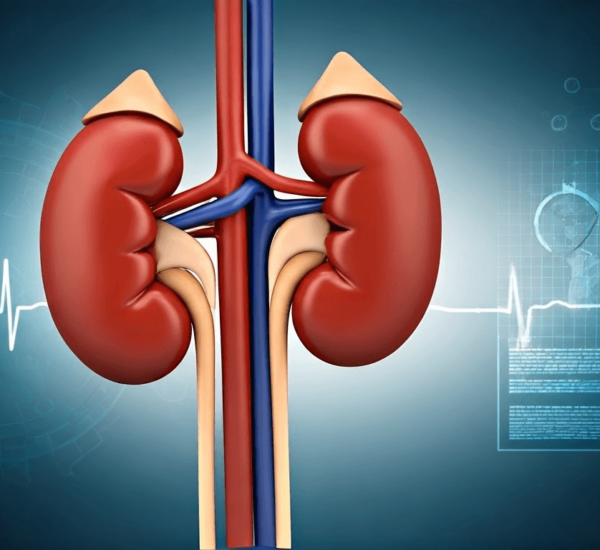Key Highlights
- Elevated creatinine levels can indicate kidney issues, signaling the need for medical attention.
- Certain supplements like omega-3, astragalus, and nettle leaf might help support healthy creatinine levels.
- Alongside potential supplement use, adopting a balanced diet low in red meat and rich in fiber is crucial for kidney health.
- Lifestyle modifications, including regular exercise, maintaining a healthy weight, and staying adequately hydrated, significantly contribute to optimal kidney function.
- It’s essential to consult with your doctor for personalized guidance on managing creatinine levels and supporting kidney well-being.
Introduction
Keeping your kidneys healthy is very important for your overall health. When your kidneys do not work well, a waste product called creatinine can build up in your blood, leading to high levels of creatinine. While you might need medicine to help, natural methods can also be helpful, especially considering the limiting of intense exercise and the use of certain medications. This article looks at five supplements that might help lower creatinine levels naturally. It also highlights the need to combine these supplements with important lifestyle changes for complete kidney care.
Top 5 Supplements to Naturally Reduce Creatinine Levels
Elevated creatinine levels can be a sign of kidney problems. It’s important to get advice from a healthcare professional for proper diagnosis and treatment. Some natural supplements might help support healthy creatinine levels.
Remember, these supplements should not replace medical treatment, and they might work differently for each person. Always talk to your doctor before adding any new supplements to your diet. This is especially important if you have health conditions or take medication.
1. Omega-3
Omega-3 fatty acids are found a lot in fatty fish, flaxseeds, and chia seeds. They are well-known for being good for heart health. These healthy fats might also help kidney health. They can lower blood pressure, which is an important cause of kidney damage.
High blood pressure can put stress on the kidneys. This stress can make it hard for the kidneys to filter waste products like creatinine. Eating foods high in omega-3s or taking supplements could help keep blood pressure levels normal. This might also help lower creatinine levels.
Still, we need more research to see how omega-3 fatty acids affect creatinine levels. It is a good idea to talk to your healthcare provider about omega-3 supplements and if they are right for you.
2. Astragalus
Astragalus is an important herb used in traditional Chinese medicine. It has been noted for its ability to support kidney function. This herb may help reduce inflammation and protect the kidneys from harm.
Some studies suggest that astragalus can lower high blood pressure, which is a major risk for kidney disease. By lowering blood pressure and reducing inflammation, astragalus may help improve kidney function and lead to healthier creatinine levels.
But, research on astragalus and its effect on creatinine levels is still limited. It is important to speak with a healthcare professional before taking astragalus, especially for those who have health problems or take other medications.
3. Nettle Leaf
Nettle leaf is often sipped as tea or taken as a supplement. It is known for its ability to help the body get rid of extra fluids and waste. This natural effect may help kidney function, especially when fluid retention is a problem.
People have used nettle leaf for kidney problems and urinary health. However, research on how it affects creatinine levels is still limited. Nettle leaf might also interact with some medications and change blood sugar levels.
Because of this, it is important to talk to a healthcare professional before adding nettle leaf to your diet. This is especially true if you have existing health problems or are taking medications.
4. Cinnamon
Cinnamon is a popular spice known for its warm taste and flexibility in cooking. It might also offer benefits outside the kitchen. Some studies show that cinnamon may help blood vessels, leading to better blood flow.
This is important for kidney health because good blood flow helps the kidneys filter waste properly. By supporting blood vessel health and circulation, cinnamon might help the kidneys remove creatinine and other waste, which could lead to lower creatinine levels.
However, these studies are just the beginning. More research is needed to confirm these benefits. It’s always a good idea to talk to your healthcare provider before adding cinnamon supplements to your diet.
5. Dandelion Root
Dandelion root is often used as a tea or supplement. It is known for helping to increase urine flow. This diuretic effect may support kidney detox by helping to remove waste like creatinine from the body.
By helping to get rid of extra fluids and waste, dandelion root and other herbal supplements may help keep kidneys healthy. However, it’s important to be careful regarding alcohol intake. Even though dandelion root is usually safe, you should talk to a healthcare professional first. This is especially true if you are taking other medications. They can help you find out if dandelion root is good for your overall health plan.
Understanding Creatinine and Kidney Function
Creatinine is a waste product that comes from how our muscles work. It is an important sign of kidney function. Healthy kidneys filter creatinine from the blood well and remove it through urine.
When creatinine levels are higher in the blood, it can mean that the kidneys are not working as they should. This shows that there may be a problem with how well the kidneys filter waste. Checking creatinine levels regularly with blood and urine tests gives good information about kidney health.
What Creatinine Levels Indicate About Your Health
Maintaining normal creatinine levels is important. It shows how well your kidneys clear waste from your blood. A doctor can measure creatinine levels with a simple blood test. They use this test to find out your glomerular filtration rate (GFR).
GFR tells how much blood your kidneys filter each minute. This helps to see how well your kidneys work. If creatinine levels are high and GFR is low, it may mean there is kidney damage or a sign of kidney disease. Other things, including the use of certain medications like chemotherapy drugs, can cause a temporary increase in creatinine levels, but consistently high levels above normal levels might mean a higher risk of kidney failure.
If a doctor finds you have high creatinine levels, they will create a treatment plan with you. This plan will focus on the underlying cause and keeping your kidney health. It usually includes lifestyle changes, changes in your diet, and sometimes medication.
How Supplements Can Influence Creatinine Levels
Certain supplements may help support healthy kidney function. They might also influence creatinine levels. However, it’s important to stay balanced when thinking about supplements. These products are not a cure for kidney disease. They should not replace prescribed medications or other important parts of a treatment plan.
Some supplements may lower creatinine levels. But, if you only rely on them without treating the real causes of kidney problems, it might not help. Also, how well these supplements work and their safety can depend on the person, their health condition, and the recommended dosage.
Because of this, it’s very important to talk to your healthcare provider before adding any supplements to your routine. They can check for any interactions, suggest the right dosages, and make sure the supplements fit your health needs and treatment plan.
Diet and Lifestyle Changes to Support Kidney Health
Making changes to your diet and lifestyle can greatly help your kidney health and control creatinine levels. These adjustments work well with your kidneys’ natural detox processes and improve your overall well-being.
By adding kidney-friendly foods and healthy habits into your daily routine, you can support good kidney function and keep creatinine levels in check. Remember, these changes should go along with, not take the place of, any medical treatment you are following.
The Role of Diet in Managing Creatinine Levels
The food you eat greatly impacts your kidney health and can help you manage creatinine levels. To support your kidneys, focus on eating nutritious foods and limit those that could harm them.
It’s a good idea to eat less red meat because it can raise creatinine levels. Instead, choose plant-based protein sources like beans, lentils, and tofu. Also, cutting back on sodium is important since too much salt can put stress on your kidneys.
Here are some other important dietary tips for managing creatinine:
- Embrace whole grains: Add brown rice, quinoa, and oats to increase fiber.
- Load up on fruits and vegetables: These provide key vitamins, minerals, and antioxidants.
- Choose lean protein sources: Include fish, skinless poultry, and low-fat dairy but in small amounts.
Lifestyle Adjustments for Optimal Kidney Function
Beyond changing what you eat, adopting healthy habits can really help your kidneys and keep your creatinine levels steady. Getting regular exercise is very important. It helps all parts of your body, including your kidneys.
Keeping a good weight is key. When someone is overweight, it can raise the risk of kidney disease. Also, checking your blood pressure and treating it with lifestyle changes or medicine can keep your kidneys safe.
Here are some more tips for healthy kidneys:
- Stay hydrated: Make sure to drink a lot of water every day.
- Limit alcohol consumption: Too much alcohol can put too much strain on the kidneys.
- Quit smoking: Smoking harms blood vessels, making it harder for blood to reach the kidneys.
- Manage stress: Look for healthy ways to handle stress, like yoga, meditation, or enjoying time outdoors.
Conclusion
In conclusion, it is important to know how supplements affect creatinine levels for good kidney health. Using Omega-3, Astragalus, Nettle Leaf, Cinnamon, and Dandelion Root can help support kidney function naturally. Also, changing your diet and making lifestyle changes are key to managing creatinine levels. By focusing on these natural methods, you can improve your overall well-being and support optimal kidney function. Always remember to talk with a healthcare provider before making any major changes. Your health is very important, so take steps today to care for it well.
Frequently Asked Questions
Can natural supplements completely normalize creatinine levels?
Natural supplements can help with healthy kidney function. However, they cannot fully return creatinine levels to normal. It is essential to work with your healthcare provider to find out what is causing the high creatinine levels. Some people may see big reductions in their levels, while others may need different treatments.
How long does it take for supplements to affect creatinine levels?
The amount of time for supplements to potentially change creatinine levels can be different for each person and also depends on the supplement itself. It’s a good idea to talk to a healthcare professional. They can help you keep track of changes by checking blood tests and urine tests regularly over time.
Are there any side effects of taking supplements to lower creatinine?
Like any supplement, those used to help kidney function can have side effects. These issues may happen if you take too much or mix them with certain medicines. It is important to speak with a healthcare professional to evaluate your personal risks.
Can lifestyle changes alone reduce high creatinine levels?
Lifestyle changes are very important for keeping your kidneys healthy and controlling creatinine levels. Eating a balanced diet, getting regular exercise, managing stress, and staying away from smoking and too much alcohol can help your kidneys work better.
What is the fastest way to lower creatinine levels?
The quickest way to lower creatinine levels depends on the cause. However, trying to treat it yourself is not a good idea. It’s important to talk to a healthcare professional for the right diagnosis and treatment that is made just for you.







